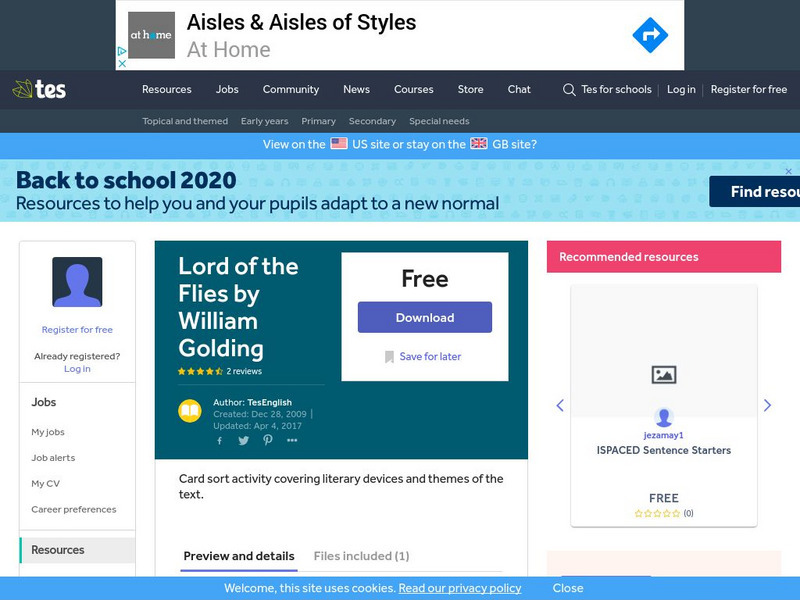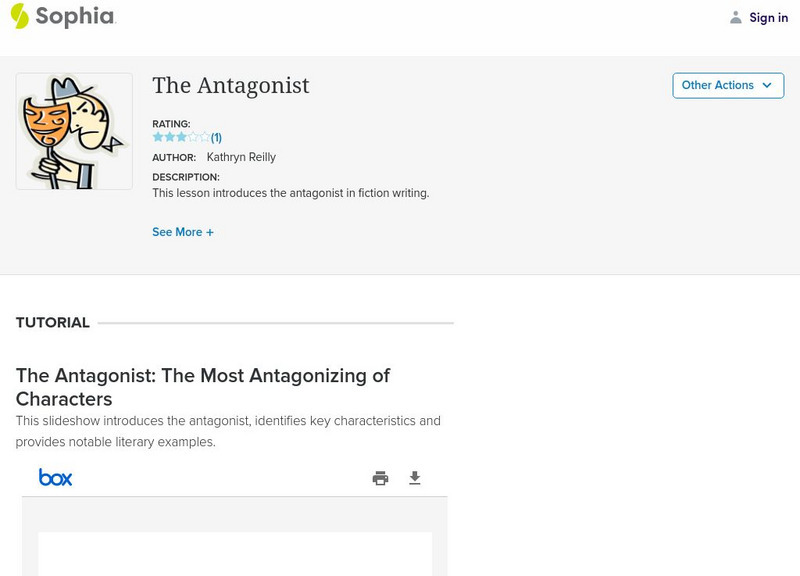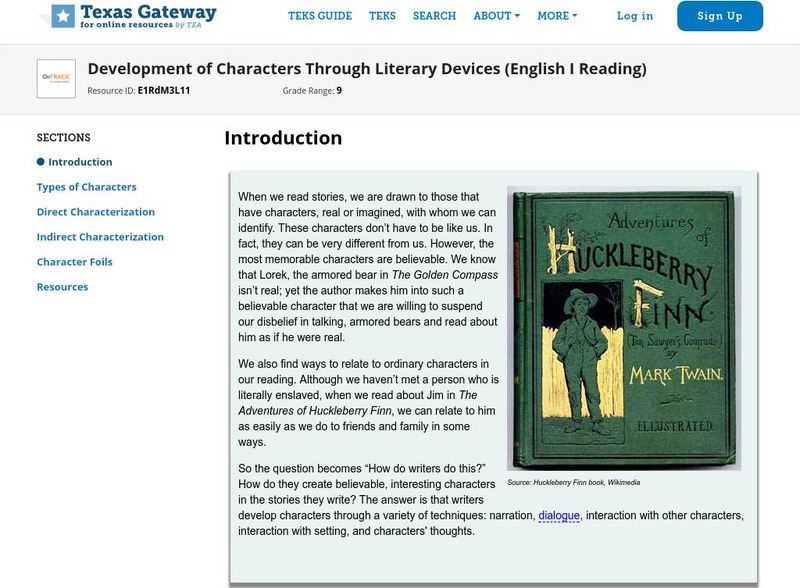Curated OER
Make Up Your Story
Putting together an interesting story can be hard, but this set of worksheets will guide your writers into the depths of their own creativity as they characterize both their main character and villain. Using humor to keep learners...
Curated OER
Creating Interesting Characters
What makes a story interesting? Complex characters! As part of a series of worksheets that prepares middle schoolers to write their own novel, the exercises included explain the role of the protagonist, the antagonist, and the supporting...
Curated OER
Antagonist
Young learners explore the antagonist. They retell Hansel and Gretel and identify the witch and the stepmother as antagonists. They then brainstorm common character traits of an antagonist, and then write a paragraph describing...
Curated OER
Dramatic Structure
As part of an lesson involving literature or writing, have your learners watch and discuss this presentation on plot development. In a series of slides, viewers engage in an activity to explore dramatic structure, including plot...
Scholastic
Writing a Myth
Use this writing prompt and brainstorming page to help your pupils prepare to write their own myths. Individuals must choose a natural event to explain, come up with a protagonist and an antagonist, determine a setting, and think of a...
Curated OER
Story Elements
Middle schoolers in particular will benefit from this simple presentation. Forty slides cover story elements like the protagonist, antagonist, and setting, and literary devices are also included. Some examples are given, but for the most...
Curated OER
Academic Vocabulary
Arm your writers with an arsenal of literary terms. With definitions of everything from plot structure and figurative language to point-of-view and types of irony, learners will gain an understanding of elements in stories and be able to...
Curated OER
Comprehension-Characters/characterization
Fifth graders discuss characterization as well as to define antagonist and protagonist. In this language arts lesson, 5th graders write questions for an interview of a character in the book "The Three Little Pigs" and then answer them....
Curated OER
Muscular System
In this muscular system worksheet, students list the factors used in naming skeletal muscles. Then they explain how fascicle arrangement in muscles contributes to muscle mechanics. Students also describe the three classes of levers in...
Curated OER
Elements of Short Stories Vocabulary
For this literature worksheet, students match the correct word from the first column to the best definition found in the second column. There are twenty words and definitions to match.
Curated OER
The Nature of the Antagonist
Students explain the differences between protagonists and antagonists and recognize the fundamental purpose of an antagonist or villain in storytelling. They also explain conflict as used in literature.
TeachEngineering
Teach Engineering: It Takes Two to Tangle
Students explore the theme of conflict in literature. They learn the difference between internal and external conflict and various types of conflicts, including self against self, self against other, and self against nature or machine....
Quia
Quia: Rags to Riches: Literary Elements
Show off your knowledge of literary elements by playing this game. Just answer 15 questions correctly, and be the big winner.
University of Victoria (Canada)
The U Vic Writer's Guide: Literary Term: Plot
This page offers a detailed overview of plot, including its various aspects and use in various types of literary works.
E Reading Worksheets
E Reading Worksheets: Character Types Worksheets and Lessons
This online learning module offers lessons about "characters" and practice exercises about "characters" in stories. These lessons are organized according to the grade levels to which they apply.
TES Global
Tes: Lord of the Flies by William Golding
[Free Registration/Login Required] Students' understanding of literary concepts related to William Golding's Lord of the Flies is reinforced with this card sort activity.
Caro Clarke
Loving Your Characters Too Much
This article is the fifth in a series that is designed to help new authors with their new novels. This lesson focuses on your main character and what happens when that character lacks character flaws.
Caro Clarke
Caro Clarke: What Is Conflict?
This is the sixth in a series of articles designed to help the new writer with their novel. This article focuses on conflict and how it effects the characters and the plot of the story. W.11-12.3a Narratives
Caro Clarke
A, B, and C Characters
This is the ninth article in a series that focuses on helping the new novel author. This article focuses on what the author calls "A, B, and C Characters," used to describe the different levels of characters.
Sophia Learning
Sophia: The Antagonist
This slideshow lesson focuses on the antagonist including defining the term, listing identifying characteristics, explaining the role of the antagonist, and providing a list of notable literary examples. It also offers links to lists of...
Annenberg Foundation
Annenberg Learner: Characters
Learn about the different types of characters in Cinderella, and determine which traits belong to the hero and villain. Click on the "Character" button.
Read Works
Read Works: Character 4th Grade Unit
[Free Registration/Login Required] A three-lesson unit on characters where learners learn about a story's protagonist and antagonist and the relationship between them by reading the book Hansel and Gretel by Rika Lesser. With free login,...
Texas Education Agency
Texas Gateway: Development of Characters Through Literary Devices
This lesson focuses on how writers develop characters through a variety of techniques: narration, dialogue, interaction with other characters, interaction with setting, and character's thoughts.
HotChalk
Hot Chalk: Lesson Plans Page: The Nature of the Antagonist
This lesson plan teaches students to understand the differences between protagonists and antagonists, to recognize a "villain" in storytelling, and to understand conflict as used in literature.





















